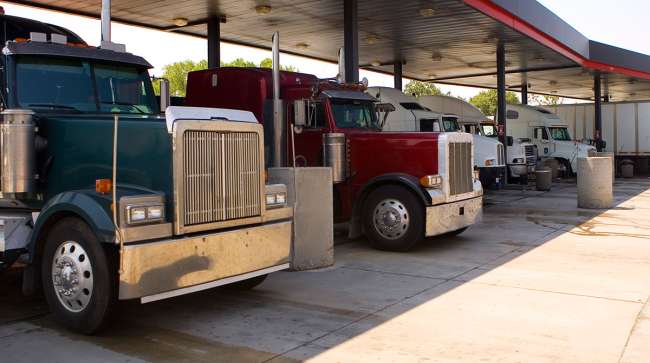Diesel Surges 16.4¢ a Gallon to Record $5.703

[Stay on top of transportation news: Get TTNews in your inbox.]
The national average price of diesel shot up 16.4 cents to settle at a record $5.703 a gallon, according to Energy Information Administration data released June 6.
Diesel's new price eclipsed the old record of $5.623, set May 9, by 8 cents. A gallon of trucking's main fuel now costs $2.429 more per gallon than it did at this time in 2021.
The increase comes after three straight weeks of declines shaved 8.4 cents off the average cost of a gallon.
U.S. On-Highway Diesel Fuel Prices

EIA.gov
Consumers saw the fourth-largest gain of the year, trailing 74.5 cents (March 7), 40.1 cents (March 14) and 34.9 cents (May 2).
Diesel’s cost rose in eight of the 10 regions in EIA’s weekly survey. The price climbed the most in the West Coast less California and California, at 32.9 cents and 28.9 cents, respectively. It fell 3.1 cents in New England and 2.9 cents in the Central Atlantic.
Gasoline, meanwhile, made an even more pronounced upward move. Gas rose 25.2 cents to reach $4.876 a gallon.
Rising prices for gasoline and diesel reflect refining margins for those products that are at or near record highs amid low inventory levels, EIA reported.
It’s concerning, not just for truckers and businesses, but everyday people.
Kamard Johnson, owner and CEO of GTT Commercial Tires
Many in trucking are seeing their money pouring out to buy fuel and the amount of money coming in shrinking, said Kamard Johnson, CEO and owner of Richmond, Va.-based GTT Commercial Tires, which operates a second store in Petersburg, Va.
“It’s concerning, not just for truckers and businesses, but everyday people” who are watching their expenses rise, too, Johnson said.
He said small fleets and owner-operators who don’t own their trucks and so have monthly payments to make, are generally the first ones who fall victim to economic circumstances.
U.S. average on-highway #diesel fuel price on June 6, 2022 was $5.703/gal, UP 16.4¢/gallon from 5/30/22, UP $2.429/gallon from year ago #truckers #shippers #fuelprices https://t.co/1xn5mD6tMZ pic.twitter.com/WjAsLomJko — EIA (@EIAgov) June 7, 2022
Johnson said many small regional fleets, especially, that increased in size around the COVID pandemic and climbing rates, now “are not getting enough of a piece of the pie to keep up with increased fuel prices.”
He expects the number of carriers will drop as it has, historically, in similar difficult conditions.
GTT deals with owner-operators and small- to midsize fleets, he said. “Ninety-nine trucks and less is our sweet spot.”
He said some customers told him they would like to see a legislative cap on the money a broker retains for arranging coverage of a load. Truckers cite their need to make truck payments, perform maintenance, and buy fuel, tires and parts.
“Right now, it’s like the wild, wild west,” Johnson said, and he’s heard “oftentimes there’s a bunch of deception with the pricing and the higher percentage is going to the broker.”
Big Impact
Small businesses account for 97% of trucking companies in the U.S., running 20 trucks or fewer.
Source: American Trucking Associations
Johnson said the soaring fuel prices and other increasing aspects of trucking (think insurance and record used truck prices) also could be limiting the number of younger drivers wanting to enter trucking, as others driving now are aging out.
“We need a trucking career to be more attractive, and, obviously, one of the biggest ways is the financial piece,” he said.
For many, “It’s going to be tough,” Johnson, said, adding that he respects how truckers serve the country. “Truckers’ contributions are the conveniences of our everyday lives.”
EIA, in its latest Short Term Energy Outlook, forecast diesel wholesale margins will fall to $1.07 in Q3 compared with $1.53 a gallon in May, and retail diesel averages will be $4.78 a gallon then.

How can trucking companies persuade new drivers to stay? Host Mike Freeze brings in onboarding expert Anthony Pellegrino of Ag Energy Transport. Tune in above or by going to RoadSigns.TTNews.com.
The agency forecast retail gasoline prices to average $4.27 a gallon in Q3.
U.S. refinery utilization averages 94% in Q3 in its forecast as a result of high wholesale product margins. While that would lift refinery utilization to at or near the highest levels in the past five years, operable refinery capacity is about 900,000 barrels a day less than at the end of 2019, it reported.
The North American Council for Freight Efficiency offers these driving tips:
• Watch your speed. A truck traveling at 65 mph will experience a fuel efficiency increase of about 27% compared with a truck traveling at 75 mph.
• Accelerate smoothly. Fast, hard acceleration wastes fuel and is hard on the engine.
• Check tire inflation pressure. Underinflated tires result in decreased fuel efficiency and increased tire wear.
Meanwhile, West Texas Intermediate futures rose above $120 a barrel, trading near a three-month high June 7, according to Bloomberg News.
Crude oil prices are the single-largest factor in shaping fuel pump prices.
Want more news? Listen to today's daily briefing below or go here for more info:


